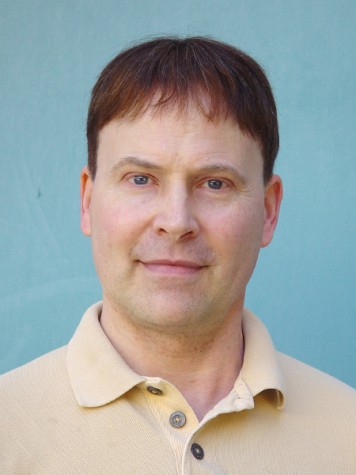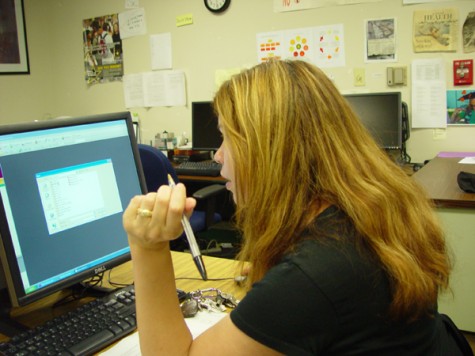In his PowerPoint lecture on Oct. 26, calculus professor Michael Allen examined a leading mathematical theory behind decision-making when risk is involved.
“People take risks at the casino but also in life,” said Math Professor Sid Kolpas in introducing Professor Allen and his topic “Choice Mathematics: The Casino of Life,” based on a 2010 article by Nicholas Barberis that had been circulating a year before it was published. Allen, 45, began studying the mathematical modeling of decision-making in high school.
Addressing a classroom full of very attentive students and faculty, Allen, who holds master’s degrees in both math and philosophy, hoped that his complex theories would not go right over their heads. To impress some of the biggest brains at GCC, he maintained a rapid-fire presentation.
“Even if you know the future pretty well, there are a lot of facets to making the right choices,” said Allen. “How are you going to feel after you take one path versus another?”
The PowerPoint slides gave explanations, formulas and graphs of the decision-making nature of certain types of gamblers. As the returns on bets fluctuate, so does the gambler’s mood and betting strategy.
How a human gambler responds to gain and loss is not symmetric like it is for Homo oconomicus, an imaginary being Allen dreamed up to demonstrate the rational, predictable decision-maker. “Homo oconomicus has only one desire: to increase his wealth.”
Instead of subscribing to the law of diminishing returns, for example, a human gambler may risk even more wealth to recoup previous losses and wind up in big trouble.
“Homo oconomicus has an unwavering readiness to take a risk as long as the odds of succeeding are greater than 50 percent,” said Allen. In other words, he is not overly concerned about taking a risk nor is he overly attracted to gambling.”
The St. Petersburg paradox coin toss illustrates a game where the odds are 50 percent or better. “If the first toss is heads, you lose your bet. If tails, you’re still in,” said Allen. “As soon as the coin comes up heads, the game is over. If the second toss is heads, you win your bet back. If you survive three tosses, you’ll receive two times your bet; four tosses, four times your bet; five tosses, eight times your bet.” In other words, winnings can increase exponentially as long as the coin doesn’t land on heads.
Homo oconomicus would never play the lottery because the odds of winning the lottery are about one in 100 million, which is 0.000001 percent. “With the lottery, I have virtually the same chance of winning if I buy a ticket or if I don’t buy a ticket,” said Allen.
Whereas Homo sapiens may gamble just for the fun of it or “for the joy of torturing an enemy,” joked Allen, all that Homo oconomicus gambles for is wealth. “He can flawlessly assess what choices are available and which course of action has the best probability of success,” he said. “And he will seek the greatest good for the greatest number,” said Allen referring to the concept of utilitarianism, a philosophical theory of ethical decision-making.
As a gambler’s bets pay off, utility increases. As his wealth decreases, his satisfaction goes down too.
Allen then flipped through a series of graphs showing the different types of gamblers comparing them all to Homo oconomicus. To avoid making irrational gambles in life, it helps to identify what kind of gambler one is.
The “fair” gambler has unwavering readiness to make a bet. He has the same gambling behavior as Homo oconomicus.
The “reckless” gambler is risk-seeking. He feels gains more strongly and brushes off losses more readily. A reckless gambler should plan ahead for casino play by leaving the bulk of his cash with his wife to prevent gambling all of it away.
The “cautious” gambler is risk-averse. He feels losses more strongly and feels gains less strongly than Homo oconomicus.
The “poor” gambler will not be that happy until his winnings really mount up. Losing a little is not so upsetting, but big losses are devastating.
The rich gambler is the opposite of poor – he will be very happy with a first win and soon tire as the winnings keep rolling in. A small loss is quite upsetting, yet large losses don’t make that much of a difference to him. He is rich.
The most “common” type of gambler is thrilled with a small win but less and less excited with larger and larger winnings.” He is not upset with a small loss, but very upset with bigger losses.
The “winning” gambler has discontinuity – he is obsessed with winning but can’t bear to lose even a penny. He must win at least a certain amount or he won’t be excited at all.
The “desperate” gambler must win at least a certain amount – usually to pay off a loan shark. His satisfaction is fixed in the negative unless he wins the amount needed to pay off his debt and presumably remain alive.
Every casino knows that in the long run, it will always win because all the gaming odds are rigged in the house’s favor. The house also knows that the average gambler will continue to bet with the hope of getting back to his break-even point so as to avoid having to say to his friends, “I lost.”
“Naifs gamble about twice as long as they should [in the casino],” said Allen. Prospect theory, which describes the odds involved in risky decisions, predicts that inexperienced casino play is perilous. Some will gamble and gamble until they have lost everything. “Sophisticates,” on the other hand, know that they can stick to a quitting plan or else they will never start.
“If you have a proper level of preparedness, wording and emotions should not affect your choice, only the final goal is important,” said physicist Poghos Kazarian.
People tend to overreact to small probability events. It’s easy to imagine winning the lottery and this overreaction leads people to buy a ticket. Likewise, people are now afraid to go in the ocean after the recent fatal shark attack off the coast of Santa Barbara.
Allen’s good friend, Glendale geography professor Michael Reed, said, “Did you know that in 2008, less than three people were killed by sharks worldwide, whereas 190 people were killed by falling coconuts?” His comment got a lot of laughs.
“I’ve never spent more than $20 in Vegas in my whole life,” said Reed after the talk. “What I’m interested in personally are the other types of gambles we have to make: who to marry, which house to buy and when to buy it, whether society can afford to ignore global warming.”
Reed said Allen’s graphs of the concepts were illuminating, and his conversational explanations helped clarify what kinds of decision-makers we are and why.
“The audience was really hard to read,” said Allen three days after his lecture. “But I got a lot of positive e-mails afterwards, so apparently it went over better than I had thought. Math department chair Kathy Holmes said she “enjoyed every minute of it.”
For information on upcoming lectures, the math department can be reached at (818) 240-1000 ext. 5657.


